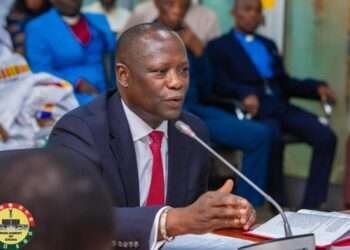Traders at the Racecourse market in Kumasi are expressing deep disappointment with the New Patriotic Party (NPP) government’s failure to complete phase two of the Kumasi Central Market project. The Combined Kumasi Central Market Traders Union, comprising various trader groups, is raising concerns over the unmet project deadlines and the consequent challenges impeding trading activities at the Racecourse market.
Draped in red bands symbolizing their discontent, the traders are now taking a more assertive stance, threatening to vote out the ruling party if their demands for the completion of the stalled project are not met. Emelia Kwofie Asare, Secretary of the Combined Kumasi Central Market Traders Union, conveyed the frustration of the traders during a press briefing.
“We came the first time about a year ago with an appeal. This time, we are not appealing; we are demanding that it is done for us. It is our right, and we demand it. What we have come to know is that the NPP government is taking us for a joke. I think the NPP government keeps lying to us, and we are not taking this anymore. That is our message to the sitting government…
“This is the stronghold of the NPP. We were looking at them; we were counting on them to work for us. That is why we voted them into power. Unfortunately, the Ashanti region is disappointed; Kumasi is disappointed, the central market is disappointed, traders of the Kumasi Combined Central Market Union are disappointed.”
Emelia Kwofie Asare
The traders are now considering seeking the intervention of Asantehene Otumfuo Osei Tutu II to spearhead a fundraising campaign aimed at completing the stalled project. The call for royal intervention highlights the depth of disillusionment among the traders and their perceived abandonment by the political leadership.

The Kumasi Central Market project, crucial to the local economy, has faced persistent delays, leaving the Racecourse market in a state of uncertainty. The traders argue that the uncompleted project not only hampers their daily business activities but also reflects a broader neglect of the development of the Ashanti Region by the government.
In their plea to Asantehene Otumfuo Osei Tutu II, the traders are seeking a powerful ally to revive the central market project and address the palpable discontent within the region.
“Now we are appealing to Otumfuo to rise and resurrect the central market. The NPP government has killed the central government. We are asking the Asantehene to raise it up again.”
The aggrieved traders contend that Kumasi, considered the stronghold of the NPP, had placed its trust in the ruling party for development, especially concerning the critical Kumasi Central Market project. However, the perceived neglect and unfulfilled promises have led to a disillusioned electorate willing to take decisive action.
As the traders gear up for potential political repercussions, the Kumasi Central Market project stands as a symbol of unfulfilled expectations and a test of the government’s commitment to regional development. The NPP government now faces the challenge of reconciling its promises with tangible actions to address the grievances and restore the trust of Kumasi’s disappointed traders.
Kumasi Central Market
The Kumasi Central Market, situated in the heart of Kumasi, Ghana’s second-largest city, has a rich history deeply intertwined with the cultural and economic tapestry of the Ashanti Region. Established during the British colonial era in the late 19th century, the market quickly evolved into a bustling commercial hub.
Originally named Kejetia Market, it served as a central trading post for diverse goods, including textiles, spices, and crafts. Over the decades, the market expanded organically, adapting to the changing needs of the growing community.
A pivotal moment in its history occurred in the 1970s when a major reconstruction transformed Kejetia Market into the Kumasi Central Market we know today. The market’s architecture was reimagined, with various sections and pavilions constructed to accommodate the diverse array of goods and services offered by local traders.
Despite facing occasional challenges, such as fires and the need for renovations, the Kumasi Central Market has endured as a symbol of economic vibrancy and cultural heritage. It stands as a testament to the resilience of the people of Kumasi and their unwavering commitment to fostering a thriving commercial environment within the heart of the Ashanti Region.
READ ALSO: Unwarranted Stagnation: The Unfortunate Stand Against A Free SHS Policy Review




















